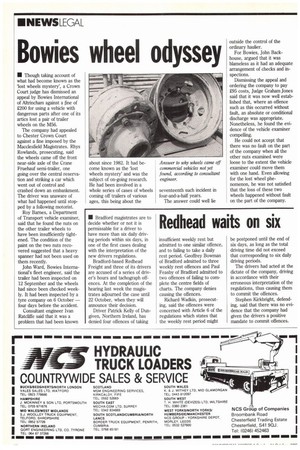Bowies wheel odyssey
Page 18

If you've noticed an error in this article please click here to report it so we can fix it.
• Though taking account of what had become known as the 'lost wheels mystery', a Crown Court judge has dismissed an appeal by Bowies International of Altrincham against a fme of 2200 for using a vehicle with dangerous parts after one of its artics lost a pair of trailer wheels on the M56.
The company had appealed to Chester Crown Court against a fine imposed by the Macclesfield Magistrates. Rhys Rowlands, prosecuting, said the wheels came off the front near-side axle of the Crane Fruehauf semi-trailer, one going over the central reservation and striking a car which went out of control and crashed down an embankment. The driver was unaware of what had happened until stopped by a following motorist.
Roy Barnes, a Department of Transport vehicle examiner, said that he found the nuts on the other trailer wheels to have been insufficiently tightened. The condition of the paint on the two nuts recovered suggested that a heavy spanner had not been used on them recently.
John Ward, Bowies International's fleet engineer, said the trailer had been inspected on 12 September and the wheels had since been checked weekly. It had been inspected by a tyre company on 6 October — four days before the accident.
Consultant engineer Ivan Ratcliffe said that it was a problem that had been known about since 1982. It had become known as the 'lost wheels mystery' and was the subject of on-going research. He had been involved in a whole series of cases of wheels coming off trailers of various ages, this being about the seventeenth such incident in four-and-a-half years.
The answer could well lie outside the control of the ordinary haulier.
For Bowies, John Backhouse, argued that it was blameless as it had an adequate arrangement of checks and inspections.
Dismissing the appeal and ordering the company to pay 295 costs, Judge Graham Jones said that it was now well established that, where an offence such as this occurred without fault, an absolute or conditional discharge was appropriate. Nonetheless, he found the evidence of the vehicle examiner compelling.
He could not accept that there was no fault on the part of the company when all the other nuts examined were loose to the extent the vehicle examiner could move them with one hand. Even allowing for the lost wheel phenomenon, he was not satisfied that the loss of these two wheels happened without fault on the part of the company.
























































































































